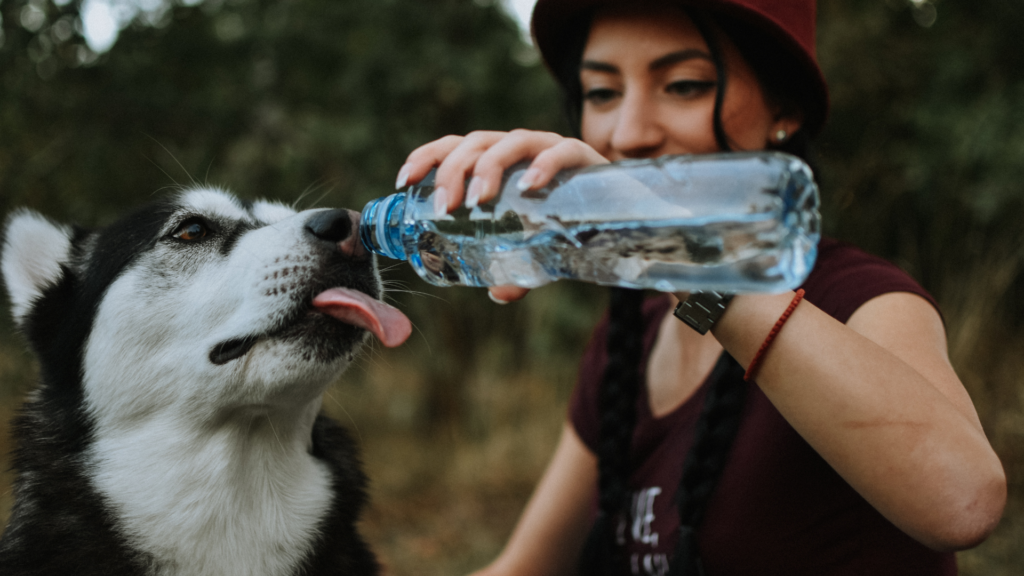As the good dog owner you are, you’re always sure your pup gets adequate nutrition and that their belly is full and happy. You also probably leave out a bowl of water for them to sip on throughout the day. But have you ever monitored your dog’s water intake to see if they’re getting enough fluids?
Dogs require adequate fluids to maintain their health and cognitive functions, and, if they don’t get enough water, their health can quickly start to decline. To ensure your dog doesn’t enter the danger zone of dehydration, we’ve put together a few tips, along with key signs of trouble, to monitor and keep their water intake up to par.
Contents
How Much Water Do Dogs Need?
Dogs, like all mammals, require water to keep their bodies functioning at peak performance. Water also plays a critical role in your dog’s overall nutritional health, as it enables cells to absorb nutrients properly. To maintain their health and normal bodily functions, dogs require about ½ to one fluid ounce of water per pound of bodyweight. So, for a twenty pound pup, that’s about 10 – 20 fluid ounces of water per day (roughly 1 ¼ to 2 ½ cups per day).
But that’s just a baseline. If the weather is excessively hot, your dog will be panting more often, and will require more fluid to make up for the sweat they lose due to the heat. Pregnant pups, for example, require nearly double that since their bodies are working harder.
Additionally, active pups require more water per pound of body weight since they’re burning energy and losing fluid more often. If you took your dog on a particularly long walk or hike, or spent extra time running around at the dog park, you’ll want to up their water intake for the day to make up for the deficit they’ll burn off.
What Happens if My Dog Doesn’t Get Enough Water?
Just like it is the case for humans, too little water in dogs can lead to dehydration, which can be extremely dangerous for their health. By nature, dogs can survive without water for three days, however, dehydration, and the signs of it, can set in as little as 24 hours.
As their body tries to make up for the water loss, your dog’s blood flow slows down, which reduces the delivery of oxygen to organs and tissue. When dehydration sets in, your dog also loses essential vitamins, minerals, and electrolytes (like sodium, chloride, and potassium) which help your dog’s body with everything from absorbing nutrients to cells, to regulating nerve and muscle function.
Along with just generally slowing down and becoming weaker, if your dog isn’t getting the fluids they need each day, dehydration can quickly lead to kidney failure, organ failure, and even death in the most severe cases.
How to Tell if Your Dog is Dehydrated
Being able to identify the warning signs that your dog is dehydrated is essential to ensuring you get them the help they need before it can get dangerous. The first step is to start monitoring your dog’s water intake and make sure they get their ½ to one fluid ounce of water per pound of body weight each day.
One of the first indicators of dehydration is loss of elasticity in your pup’s skin. You can test this by lightly pulling on their skin, and, if it doesn’t snap back (almost like a rubber band), your dog could potentially be experiencing dehydration.
Other common signs include loss of moisture in your dog’s gums, which causes them to become dry and almost sticky, along with loss of appetite, excessive panting, and a dry nose.
What to Do if Your Dog is Dehydrated
If you know your dog hasn’t had enough water and they’re showing signs of dehydration and/or heat stroke, time is of the essence. Contact your veterinarian immediately, who can help restore their fluids through an IV and boost their electrolytes to help them feel better.
Finally, to prevent dehydration before it can even set in, be sure to keep plenty of water bowls in your home for your dog, and take a travel bottle with you so they’re never left without the necessary liquid when away from home – especially in the warmer months.


